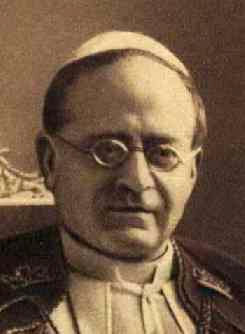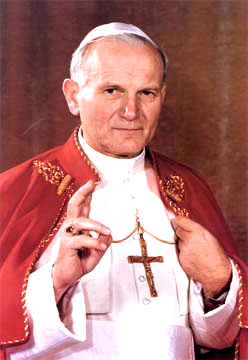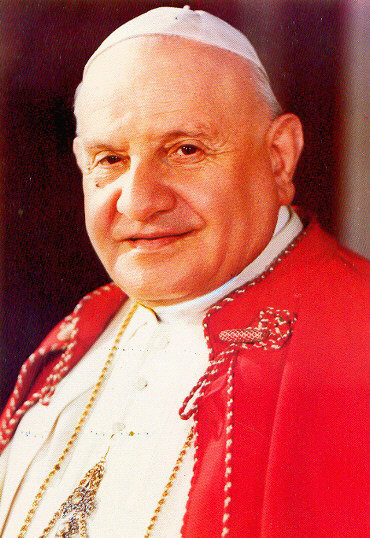Catholic social teaching on capitalism
Capitalism must be corrected
The social doctrine of the Church stands above existing economic systems, since it confines itself to the level of principles. An economic system is good only to the extent that it applies the principles of justice taught by the Church. As Pope John Paul II wrote in 1987, in his encyclical letter Sollicitudo Rei Socialis: "The tension between East and West is an opposition... between two concepts of the development of individuals and peoples, both concepts being imperfect and in need of radical correction... This is one of the reasons why the Church’s social doctrine adopts a critical attitude towards both liberal capitalism and Marxist collectivism."
We may understand why the Church condemns Communism or Marxist collectivism which, as Pope Pius XI wrote, is "intrinsically evil" and anti-Christian, with its avowed goal being the complete destruction of private property, family and religion. But why would the Church condemn capitalism?
|
|
|
John Paul II |
In his encyclical letter Centesimus Annus (n. 34), John Paul II recognizes the merits of free enterprise, private initiative and profit: "It would appear that, on the level of individual nations and of international relations, the free market is the most efficient instrument for utilizing resources and effectively responding to needs. But this is true only for those needs which are ‘solvent’, insofar as they are endowed with purchasing power, and for those resources which are ‘marketable’, insofar as they are capable of obtaining a satisfactory price. But there are many human needs which find no place on the market. It is a strict duty of justice and truth not to allow fundamental human needs to remain unsatisfied and not to allow those burdened by such needs to perish."
A little further in the same encyclical (n. 42), the Pope explains what is acceptable and what is not, in capitalism:
"Returning now to the initial question: can it perhaps be said that, after the failure of Communism, capitalism is the victorious social system and that capitalism should be the goal of the countries now making efforts to rebuild their economy and society? Is this the model which ought to be proposed to the countries of the Third World which are searching for the path to true economic and civil progress?
"The answer is obviously complex. If by ‘capitalism’ is meant an economic system which recognizes the fundamental and positive role of business, the market, private property and the resulting responsibility for the means of production, as well as free human creativity in the economic sector, then the answer is certainly in the affirmative, even though it would perhaps be more appropriate to speak of a "business economy", "market economy" or simply "free economy". But if by "capitalism" is meant a system in which freedom in the economic sector is not circumscribed within a strong juridical framework which places it at the service of human freedom in its totality, and which sees it as a particular aspect of that freedom, the core of which is ethical and religious, then the reply is certainly negative."
Even if Marxism has collapsed, this does not mean the triumph of capitalism. Even after the fall of Communism there are still millions of poor people and situations of injustice in the world:
"The Marxist solution has failed, but the realities of marginalization and exploitation remain in the world, especially the Third World, as does the reality of human alienation, especially in the more advanced countries. Against these phenomena the Church strongly raises her voice. Vast multitudes are still living in conditions of great material and moral poverty. The collapse of the Communist system in so many countries certainly removes an obstacle to facing these problems in an appropriate and realistic way, but it is not enough to bring about their solution. Indeed, there is a risk that a radical capitalistic ideology could spread which refuses even to consider these problems, in the a priori belief that any attempt to solve them is doomed to failure and which blindly entrusts their solution to the free development of market forces." (Centesimus Annus, 42.)
The fault that the Church finds with present capitalism is thus neither private property nor free enterprise. Far from wishing the disappearance of private property, the Church rather wishes its widespread availability so that all may become real owners of capital and be real "capitalists":
|
|
|
John XXIII |
"The dignity of the human person necessarily requires the right of using external goods in order to live according to the right norm of nature. And to this right corresponds a most serious obligation, which requires that, so far as possible, there be given to all an opportunity of possessing private property... Therefore, it is necessary to modify economic and social life so that the way is made easier for widespread private possession of such things as durable goods, homes, gardens, tools requisite for artisan enterprises and family-type farms, investments in enterprises of medium or large size." (Pope John XXIII, encyclical letter Mater et Magistra, May 15, 1961, nn. 114-115.)
Social Credit, with its dividend to every individual, would acknowledge every human being as a capitalist, a co-heir of the natural resources and progress, some of which are human inventions and technology.
Capitalism has been vitiated by the financial system
The fault that the Church finds with the capitalist system is the fact that each and every human being living on the planet does not have access to a minimum of material goods. So they are not allowed to have a decent life and even in the most advanced countries there are thousands of people who do not eat their fill. It is the principle of the destination of human goods that is not fulfilled: there is plenty of production, it is the distribution that is defective.
And in the present system the instrument that makes possible the distribution of goods and services, the symbol that allows people to get products, is money. It is therefore the money system, the financial system that is at fault in capitalism.
Pope Pius XI wrote in Quadragesimo Anno in 1931: "Capitalism itself is not to be condemned. And surely it is not vicious of its very nature, but it has been vitiated."
What the Church condemns is not capitalism as a producing system, but, according to the words of Pope Paul VI, "the calamitous system that accompanies it," which is the financial system:
"This unchecked liberalism led to dictatorship rightly denounced by Pope Pius XI as producing ‘the international imperialism of money’. One cannot condemn such abuses too strongly, because — let us again recall solemnly — the economy should be at the service of man. But if it is true that a type of capitalism has been the source of excessive suffering, injustices and fratricidal conflicts whose effects still persist, it would be wrong to attribute to industrialization itself evils that belong to the calamitous system that accompanied it. On the contrary, one must recognize in all justice the irreplaceable contribution made by the organization and the growth of industry to the task of development." (Paul VI, encyclical letter Populorum Progressio, on the development of peoples, March 26, 1967, n. 26.)
The defect of the system: money is created by the banks as a debt
It is the financial system that does not accomplish its purpose; it has been diverted from its end that is to allow the goods to meet the needs. Money should be nothing but an instrument of distribution and a symbol that gives a claim, in other words, a simple accounting system.
Money should be a servant, but the bankers in appropriating the control over its creation, have made it an instrument of domination. Since people cannot live without money, everyone: this includes governments, corporations and individuals; must submit to the conditions imposed upon them by the bankers to obtain money. Money means having the right to live in today’s society. This establishes a real dictatorship over economic life and so the bankers have become the masters of our lives. Pope Pius XI was quite right when he said in Quadragesimo Anno (n. 106):
 |
|
Pius XI |
"This power becomes particularly irresistible when exercised by those who, because they hold and control money, are able also to govern credit and determine its allotment, for that reason supplying, so to speak, the lifeblood to the entire economic body, and grasping, as it were, in their hands the very soul of production, so that no one dare breathe against their will."
There is no way any country can get out of debt in the present system, since all money is created as a debt: all the money that exists comes into circulation only when it is lent by the banks with interest. And when the loan is paid back to the bank, the money being withdrawn from circulation ceases to exist. In other words new money is created every time banks make a loan and this same money is destroyed every time loans are paid back.
The fundamental flaw in this system is that when banks create new money in the form of loans, they ask the borrowers to pay back more money than what was created. The banks create the principal, but not the interest. And since it is impossible to pay back money that does not exist, debts pile up or you must also borrow the amount to pay the interest. This does not solve your problem because you fall even deeper into debt.
This creation of money as debt by the international bankers is the means of imposing their will upon individuals and of controlling the world:
"Among the actions and attitudes opposed to the will of God, the good of neighbour and the ‘structures’ created by them, two are very typical: on the one hand, the all-consuming desire for profit, and on the other, the thirst for power, with the intention of imposing one’s will upon others." (John Paul II, encyclical letter Sollicitudo Rei Socialis, n. 37.)
Since money is an instrument that is basically social, the Social Credit doctrine proposes that money be issued by society and not by private bankers for their own profit. Pope Pius XI stated in Quadragesimo Anno:
"There are certain categories of goods for which one can maintain with reason that they must be reserved to the community when they come to confer such an economic power that it cannot, without danger to the common good, be left to the care of private individuals."


